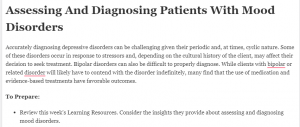Assessing And Diagnosing Patients With Mood Disorders

Accurately diagnosing depressive disorders can be challenging given their periodic and, at times, cyclic nature. Some of these disorders occur in response to stressors and, depending on the cultural history of the client, may affect their decision to seek treatment. Bipolar disorders can also be difficult to properly diagnose. While clients with bipolar or related disorder will likely have to contend with the disorder indefinitely, many find that the use of medication and evidence-based treatments have favorable outcomes.
To Prepare:
- Review this week’s Learning Resources. Consider the insights they provide about assessing and diagnosing mood disorders.
- Download the Comprehensive Psychiatric Evaluation Template, which you will use to complete this Assignment. Also review the Comprehensive Psychiatric Evaluation Exemplar to see an example of a completed evaluation document.
- Select a specific video case study to use from the Video Case Selections choices in the Learning Resources. View your assigned video case and review the additional data for the case in the “Case History Reports” document, keeping the requirements of the evaluation template in mind.
- Consider what history would be necessary to collect from this patient.
- Consider what interview questions you would need to ask this patient.
- Identify at least three possible differential diagnoses for the patient.
Select one of the following videos to use for your Assignment this week. Then, access the document “Case History Reports” and review the additional data about the patient in the specific video number you selected.
Selected Patient Video:
Symptom Media. (Producer). (2018). Training title 150 [Video]. https://go.openathens.net/redirector/waldenu.edu?url=https://video.alexanderstreet.com/watch/training-title-150
Selected Patient History:
Training Title 150
Name: Ms. Cheyenne Lisenbe Gender: female Age:18 years old T- 97.4 P- 94 R 22 136/86 Ht 5’2 Wt 121 Background: Currently living with her parents in Locust Grove, Oklahoma along with two younger sisters and 1 older brother. She is a senior in high school, not currently partnered, reports she is bisexual, lately hyper-sexual reporting increase of unprotected sex. She has been stealing money out of her grandmother’s purse to buy clothes, shoes, purses, “and just other things. She has history of treatment since age 9 for conduct disorder, depression, history of taking citalopram which worsened her irritability, aggression, impulsivity. She has been in a 90- day teen residential mental health facility discharged three months ago with lithium 300mg in am and 600mg at bedtime, aripiprazole 2.5mg in the morning. When discharged, her labs were within normal ranges and urine toxicology negative. She was positive for cannabis upon admission. Her parents believe she is hiding her medication as she has made comments “they slow me down; they make me not think fast” She has hx of domestic violence toward her older brother with juvenile assault charge. No current legal issues. Her grandmother has hx of bipolar disorder; her mother and her maternal aunt have anxiety. She is sleeping 2-3hrs/24 hrs. Reports her appetite “ravishing.” She has no medical issues; has Nexplanon implant; hx of self-harm with cutting, last engaged in the behavior 6 months ago.
Symptom Media. (Producer). (2018). Training title 150 [Video]. https://video-alexanderstreetcom.ezp.waldenulibrary.org/watch/training-title-150
THE QUESTION
Complete and submit your Comprehensive Psychiatric Evaluation, including your differential diagnosis and critical-thinking process to formulate a primary diagnosis. Incorporate the following into your responses in the template:
Subjective:
· What details did the patient provide regarding their chief complaint and symptomology to derive your differential diagnosis?
· What is the duration and severity of their symptoms? How are their symptoms impacting their functioning in life?
Objective: What observations did you make during the psychiatric assessment?
Assessment:
· Discuss the patient’s mental status examination results.
· What were your differential diagnoses? Provide a minimum of three possible diagnoses with supporting evidence, listed in order from highest priority to lowest priority.
· Compare the DSM-5-TR diagnostic criteria for each differential diagnosis and explain what DSM-5 criteria rules out the differential diagnosis to find an accurate diagnosis.
· Explain the critical-thinking process that led you to the primary diagnosis you selected. Include pertinent positives and pertinent negatives for the specific patient case.
Reflection notes:
· What would you do differently with this client if you could conduct the session over?
· Also include in your reflection a discussion related to legal/ethical considerations (demonstrate critical thinking beyond confidentiality and consent for treatment!), health promotion and disease prevention taking into consideration patient factors (such as age, ethnic group, etc.), PMH, and other risk factors (e.g., socioeconomic, cultural background, etc.).